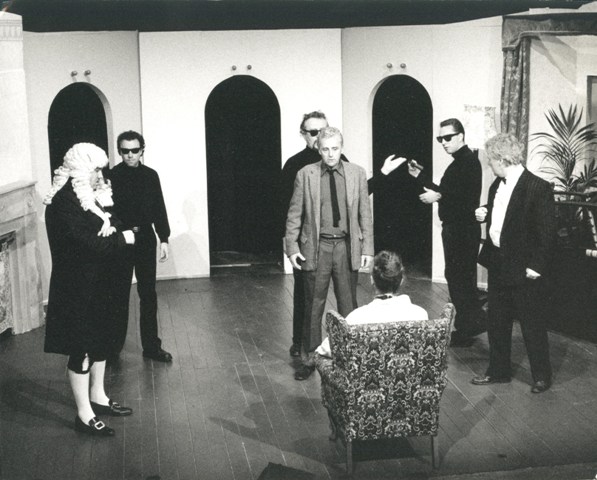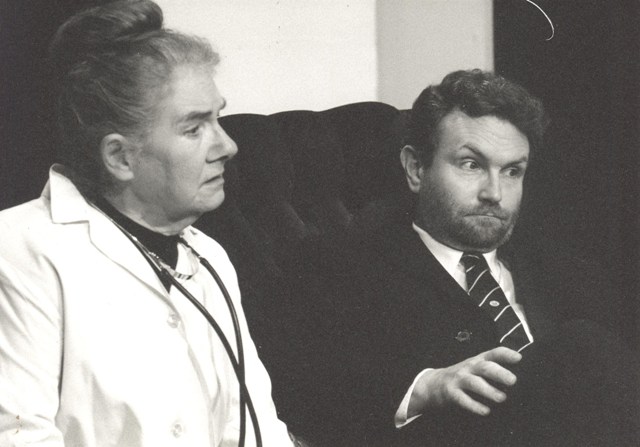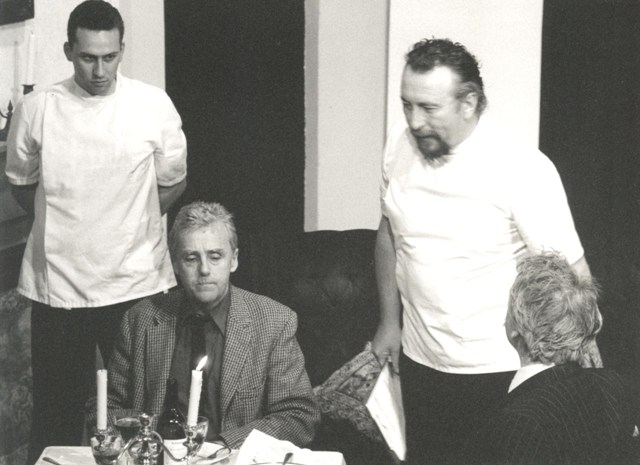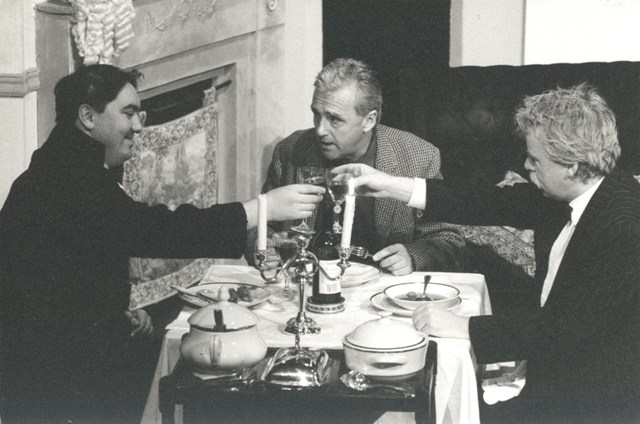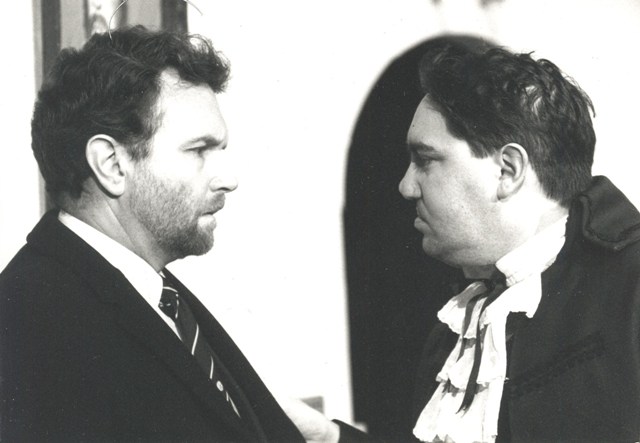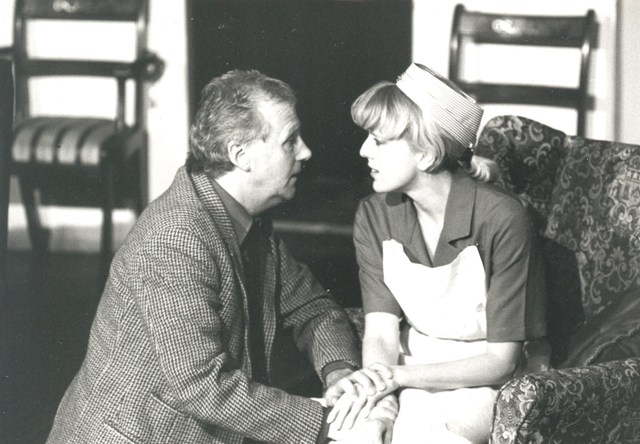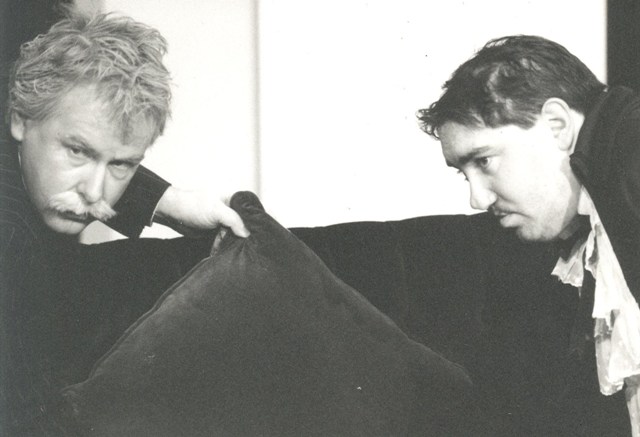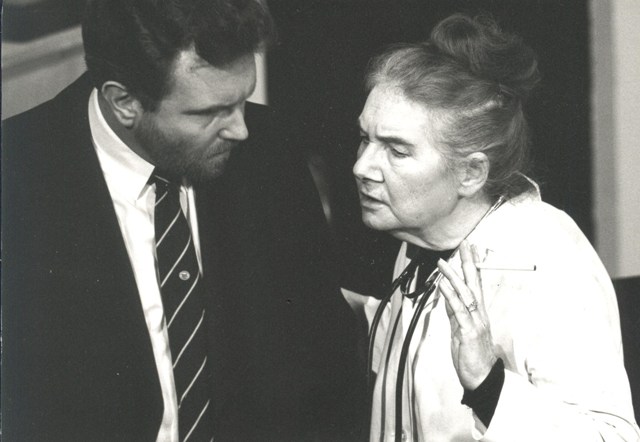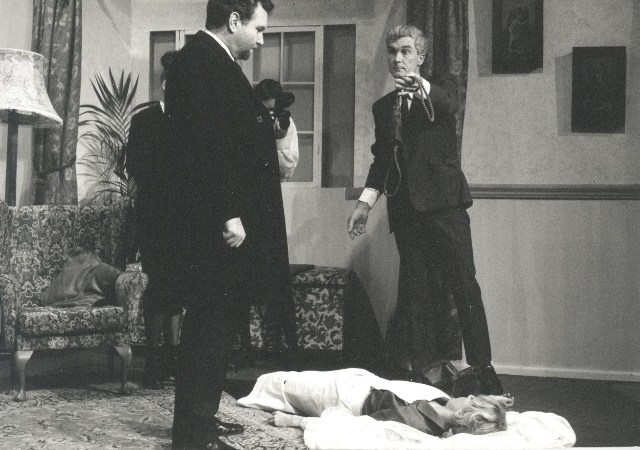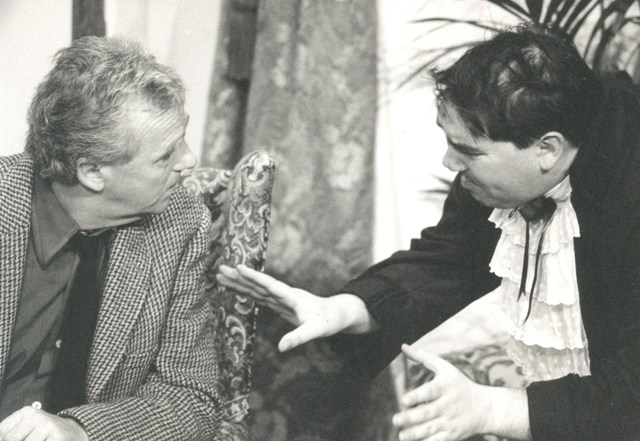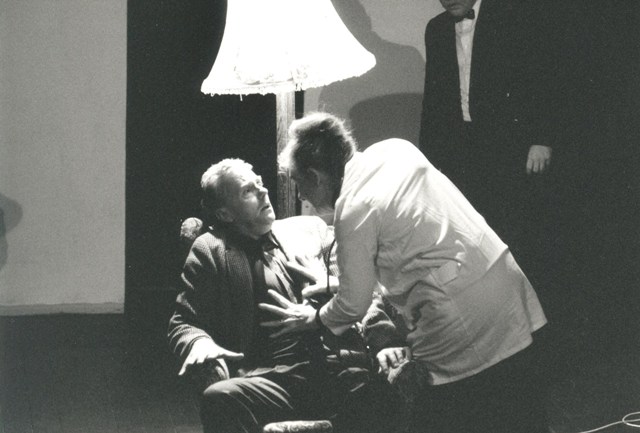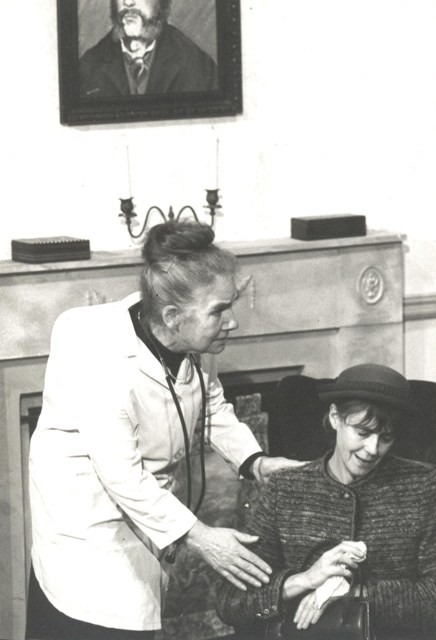The Physicists
Written by Friedrich Dürrenmatt (translated by James Kirkup)
Thurs 24th November - Sat 26th November & Tues 29th November - Sat 3rd December 1994
Directed by John Batstone
In the drawing room of an expensive sanatorium a nurse lies dead, strangled. In the next room her murderer, who believes he is Albert Einstein, plays the Kreutzer Sonata. A police investigation is under way. From such a bizarre beginning Dürrenmatt develops a profound and blackly comic exploration of the boundaries of madness and sanity, and the responsibility of the scientist in our society.
previous
production
next
production
AuthorFriedrich Dürrenmatt
Friedrich Dürrenmatt (1921 - 1990)
Friedrich Dürrenmatt was a Swiss author and dramatist. He was a proponent of epic theatre whose plays reflected the recent experiences of World War II. His work included avant-garde dramas, philosophically deep crime novels, and often macabre satire. He much admired the drama of Brecht and Thornton Wilder, but adapted the former's celebrated "alienation technique" to his own purposes; to produce the grotesque and farcical.
Born in near Berne, the son of a Protestant parson, he studied philosophy and German language and literature at both Zurich and Berne universities. He never graduated but spent much of his time in painting and sketching. Immediately after the war, in Basle, he made ends meet by writing short stories and cabaret sketches.
In 1945-46, Dürrenmatt wrote his first play 'It Is Written', which premiered to great controversy. The story of the play revolves around a battle between a sensation-craving cynic and a religious fanatic who takes scripture literally, all of this taking place while the city they live in is under siege. The play's opening night in April, 1947, caused fights and protests in the audience. His first major success was the play 'Romulus the Great'. Set in the year A.D. 476, this play explores the last days of the Roman Empire, presided over, and brought about by its last emperor. Probably his best-know work is 'The Visit' written in 1956 which centres around the theme of whether or not justice can be bought. In 1946, he married the actress Lotti Geissler who died in 1983 after which, Dürrenmatt married again in 1984 to another actress, Charlotte Kerr.
James Falconer Kirkup (1918 - 2009)
Poet, translator and travel writer James Kirkup was born in South Shields, County Durham and studied Modern Languages at Armstrong College where he co-produced the poetry magazines Dint and Fulcrum, which featured his earliest verse.
During the Second World War, Kirkup was a conscientious objector. He was teaching modern languages at The Downs School in Gloucestershire, when in 1947 his first solo collection of poems, 'The Drowned Sailor', appeared. In 1950, Kirkup's growing reputation precipitated his appointment as the first Gregory Poetry Fellow at Leeds University. Kirkup became Head of the Department of English at Bath Academy of Art in 1953, but in 1956 he left England for good. He lectured in Sweden and Spain before taking up a succession of teaching appointments in Japan, culminating in a 12-year tenure as Professor of English Literature at the Kyoto University of Foreign Studies.
In 1964, Kirkup was made Fellow of the Royal Society of Literature. He secured an Arts Council Creative Writing Fellowship at Sheffield University, and then became playwright-in-residence at the Sherman Theatre, University College, Cardiff. His long poem, "The Love that Dares to Speak its Name", was the subject of the last successful British prosecution for blasphemy. Soon afterwards, Kirkup moved to Andorra, where he wrote and published more prolifically than ever. His works include around 40 verse collections, six books of autobiography, and many translations from the French and German.
top of page
The Physicists was written in 1961 and is a satirical drama often recognised as the most impressive yet most easily understood work of the Swiss writer Friedrich Dürrenmatt. Informed by the Second World War and the many recent advances in science and nuclear technology, the play deals with questions of scientific ethics and mankind's ability to handle its intellectual responsibilities. The play was first performed in Zürich in 1962 and this translation of Dürrenmatt's original work was first produced in the UK by The Royal Shakespeare Company at the Aldwych in 1963.
The story is set in the drawing room of the oldest building in the Les Cerisiers sanatorium for the mentally ill, run by psychiatrist Mathilde von Zahnd. This drawing room connects to three sick rooms each of which is inhabited by a single mentally ill patient. These three men, all physicists by trade, are permitted use of the drawing room, where they are periodically monitored by the female nurses that are charged with their care. The first patient is Herbert Georg Beutler, and he believes that he is Sir Isaac Newton. The second patient is Ernst Heinrich Ernesti, who believes himself to be Albert Einstein. The third patient is Johann Wilhelm Möbius, and he believes that he is regularly visited by the biblical King Solomon. When the play begins, "Einstein" has just killed one of his nurses, and the police are examining the scene. It is revealed through their discussion that this is the second slaying of a nurse by one of these three patients in just three months, the first having been committed by "Newton".
The motive behind these two murders becomes clear in the play's second act, when it is revealed with startling abruptness that none of the three patients is mad. They are all only faking insanity. Möbius is actually an incredibly brilliant physicist whose discoveries include such fabled results as a solution to the problem of gravitation, a "Unitary Theory of Elementary Particles", and the "Principle of Universal Discovery". Fearing what mankind could do with these powerful discoveries, Möbius chose not to reveal his work. He instead feigned madness, that he might be committed to a sanatorium and thus protected along with his knowledge. Möbius, though, failed to avoid attention. "Einstein" and "Newton" are both spies, representatives of two different countries, and they have penetrated Les Cerisiers in order to secure Möbius' documents and, if possible, the man himself. Each spy murdered a nurse to protect his secrets and to strengthen his simulation of madness.
In the play's climactic scene, all three men reveal their secrets, and each spy attempts to convince Möbius to come with him. It is he, however, who is successful in convincing them. He persuades them that the secrets he has discovered are too terrible for man to know and assures them that their efforts are in vain because he recently burned all the papers that he developed during his time in the sanatorium. After much debate, the three men finally agree that they are content to protect mankind by living out the rest of their lives in captivity.
However, these noble plans are thwarted by the play's final plot twist. Fraulein Doktor Mathilde von Zahnd, head of Les Cerisiers, enters the drawing room and reveals to the three men that she has eavesdropped on their entire conversation. Furthermore, she has known about Möbius for years and has been secretly copying his documents and using his scientific discoveries to construct an international empire. She believes that King Solomon is speaking to her, and she believes that with his guidance and Möbius' discoveries she can become the most powerful woman on earth.
The story ends with a sense of impending doom. Möbius, "Newton", and "Einstein" have been outmaneuvered and trapped. "Those things which were thought can never be unthought." The play ends with each of the three men speaking directly and pitiably to the audience, emphasizing their plight and the plight of all mankind.
top of page
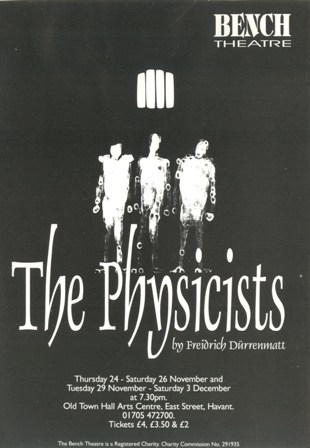
This play was staged at Havant Arts Centre, East Street Havant - Bench Theatre's home since 1977.
| Police Doctor | Andrew Ingle |
| Fraulein Guhl, police stenographer | Ingrid Glue |
| Policeman | Tony Ford |
| Policeman | Christopher Stacey |
| Fraulein Blocher, police photographer | Shona Dillon |
| Police Inspector Voss | David Penrose |
| Matron Marta Boll | Ingrid Corrigan
Sally Hartley (Nov 26th) |
| Herbert Georg Beutler (Newton) | Damon Wakelin |
| Fraulein Doktor Mathilde von Zahnd | Rita de Bunsen |
| Ernst Heinrich Ernesti (Einstein) | Andrew Rees |
| Frau Lina Rose | Rosemary Sawyer |
| Oskar Rose, her husband, a missionary | Frank Lyons |
| The Children of Möbius | Steven Long
Charlotte Evans
Cadi Jones |
| Johann Wilhelm Möbius | Pete Woodward |
| Nurse Monika Stettler | Jude Salmon |
| Uwe Sievers, chief male attendant | Peter Corrigan |
| McArthur, a male attendant | Christopher Stacey |
| Murillo, a male attendant | Tony Ford |
Crew
| Director | John Batstone |
| Stage Management team | Lindy Nettleton
Sally Hartley
Susan Marlow
Gemma Harding
Margaret Houlton
|
| Lighting | Steve Wilkins
Andrew Caple |
| Sound Recording | John O'Hanlon |
| Sound Operation | Amanda Calver |
| Newton's Costume | The Haslemere Wardrobe |
| Costumes | Rita de Bunsen |
| Recorder teacher | Christopher Burgess |
| Leaflet and Poster Design | Pete Woodward |
| Set Design and painting | George Hatton
Serena Hatton |
| Set Construction | Tim Taylor |
| Front of House | Rebecca Webb |
Director's Notes
The introduction prepares us for the tone of voice we hear as the play's dreadful events unfold; wry, alert, ironic. The tension of the play derives partly from the borderlines it inhabits: between security and imprisonment, between sanity and madness, between responsibility and escape. One of Dürrenmatt's theses is that modern age is incapable of tragedy, as tragedy presupposes guilt and in modern times we have lost this sense. In the play the physicists in fact aspire to the condition of tragedy because they acknowledge the guilt in their recognition of the consequences of their discoveries. Only in the madhouse can they be free but by the bitterest of twists their withdrawal has finally brought about their own downfall and opened the way for an appalling fate to envelope mankind, all of us.
In keeping with the spirit of the play, is the irony that whilst this production was being prepared, on Sunday November 6th, The Observer's front page carried the following item:-
"Britain and Continental Europe face an ever-growing threat of environmental catastrophe from the crisis in the former Soviet Union's nuclear industry... Russian government documents reveal the true extent of the potential disaster... the chaos brought about by the break-up of the Soviet Union has left the nuclear industry in tatters - with appalling consequences. A reactor meltdown or catastrophic airborne release of radio-activity is an increasing risk.
Radio-active material is being transported across Russia without radiation hazard markings; there is no state system of control and accounting of nuclear materials in Russia; Russia cannot cope with its approximately 610 million cubic metres of radio-active waste. Solid waste is kept in the open and allowed to rust; liquid waste is stored in ponds and underground."
The report goes on to describe one specific horrifying incident at the Tomsk-7 Siberian Chemical Combine relating to a complicated process involving the dissolving of fiercely irradiated lumps of strontium, ruthenium, nionium, zirconium, uranium and plutonium in concentrated nitric acid.
"A sudden jump in pressure shattered the apparatus; nitric acid mixed with organic materials and the gases that erupted from the retorts and reactors exploded, wrecking the installation. One wall of the main building cracked open and gusts of highly radio-active material swept out into the cold Siberian dawn. The worst nuclear accident since Chernobyl had just occured..."
The report concludes: "As academic Georgiv Arbatov observed after Chernobyl, "How technologically vulnerable the whole of modern civilisation has become". Only one thing has changed since then. We are no longer vulnerable. We are virtually defenceless."
How prescient then, that writing this play over thirty years ago, at almost the same time as - in this country - Harold Wilson was warmly embracing "The white heat of technology" Dürrenmatt was already sounding caution; Möbius says "There are certain risks which one may not take: the destruction of humanity is one."..."Fame beckoned from the university; industry tempted me with money, Both courses were too dangerous.".
What have we learned?
John Batstone
top of page
Production Photographs

